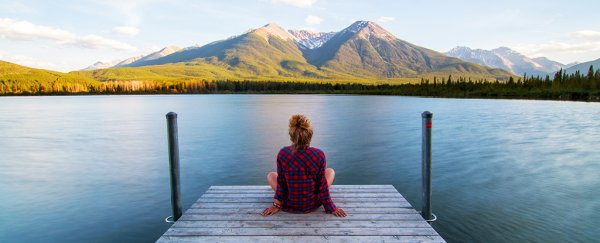At the end of a dark earthen trail in the Peruvian Amazon stands a round structure with a thatched roof that appears to glow from within.
In the Temple of the Way of Light, as it is known, indigenous healers called Onanya teach visitors about the therapeutic uses of ayahuasca, a hallucinogenic brew that's been used by locals for thousands of years.
Across the Atlantic, researchers in an ornate blue-tiled hospital in Barcelona, Spain are studying ayahuasca's physical effects on the brain.
The teams in those two disparate locations approach the study of the psychedelic drug very differently, but researchers at each one are coming to similar conclusions about the way ayahuasca affects the mind.
Among volunteers who take ayahuasca for studies, scientists have documented a rise in certain key traits that mirror those of experienced meditators. These changes include increases in openness, optimism, and a particularly powerful ability known as decentering.
Amanda Feilding, the founder and director of the UK-based nonprofit Beckley Foundation, collaborates with scientists around the world to understand how psychedelic drugs affect the brain.
Feilding describes decentering as "the ability to objectively observe one's thoughts and feelings without associating them with identity".
Decentering might sound esoteric, but it's one of the key aims of mindful meditation and is also a goal of successful depression treatments in some cases.
In volunteers who've taken ayahuasca as part of Beckley's research, decentering has been linked with higher scores on questionnaires designed to measure well-being and happiness and lower scores on measurements of depressive or anxious thoughts and symptoms of grief.
"It's interesting because even though our research out of Peru is based on surveys, while in Barcelona it's based on more traditional scientific research, our results out of both places are showing an increase in these traits," Feilding says.
"It seems patients are finally able to liberate themselves from the emotional pain they have long been suffering from. To calmly observe one's thoughts and feelings in an objective way in order to become less judgemental and more self-accepting."
Since the findings out of Peru are based on surveys, they can't prove that ayahuasca caused the reduction in symptoms of depression and grief - only that there's a connection between the two.
But in Spain, as part of a collaboration between Beckley and Sant Pau hospital, neurologist Jordi Riba is looking at the brain activity in depressed volunteers who are given ayahuasca.
His findings indicate that in addition to people simply reporting that they feel more decentered and less depressed after taking ayahuasca, there is a corresponding neurological change in their brain activity.
One small study of 17 depressed volunteers who took ayahuasca saw a decrease in activity in areas of the brain that tend to be overactive in conditions like depression and anxiety.
And a new study of regular ayahuasca users suggests a physical shrinking in these parts of the brain, though that work has not yet been published in a peer-reviewed journal.
These findings are bolstered by other research on the potential therapeutic effects of psychedelics. Studies out of New York University and Johns Hopkins suggest that the psychedelic drug psilocybin - the ingredient in magic mushrooms - elicits similar effects among depressed people.
"With the psilocybin, you get an appreciation - it's out of time - of well-being, of simply being alive and a witness to life and to everything and to the mystery itself," Clark Martin, a patient who participated in one of the Johns Hopkins trials, previously told Business Insider of his experience.
David Nutt, director of the neuropsychopharmacology unit at Imperial College London, has been working with Feilding, and says the brains of people with depression or addiction get locked into patterns of thinking driven by the brain's control centre.
"Psychedelics disrupt that process so people can escape," he says.
This article was originally published by Business Insider.
More from Business Insider:
